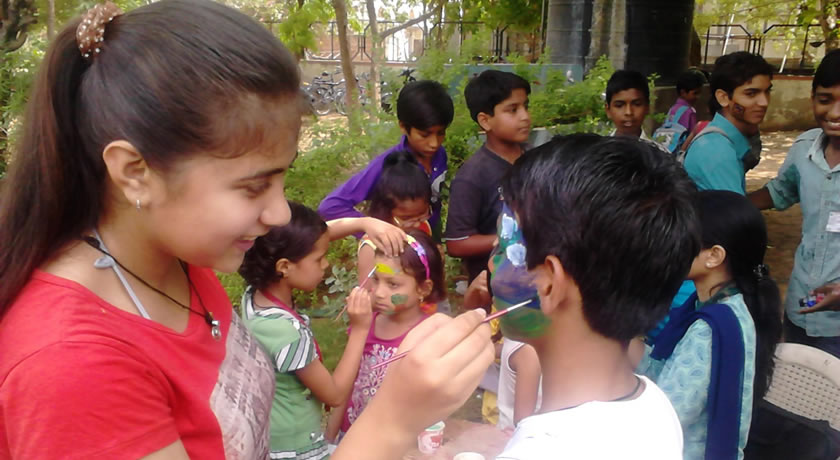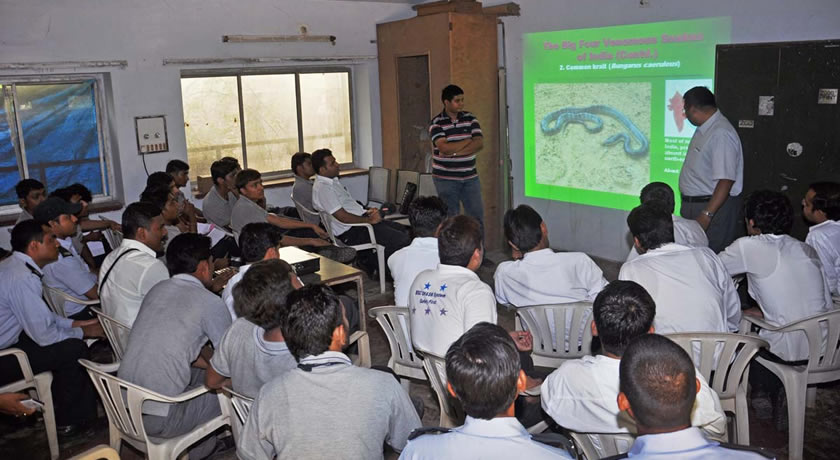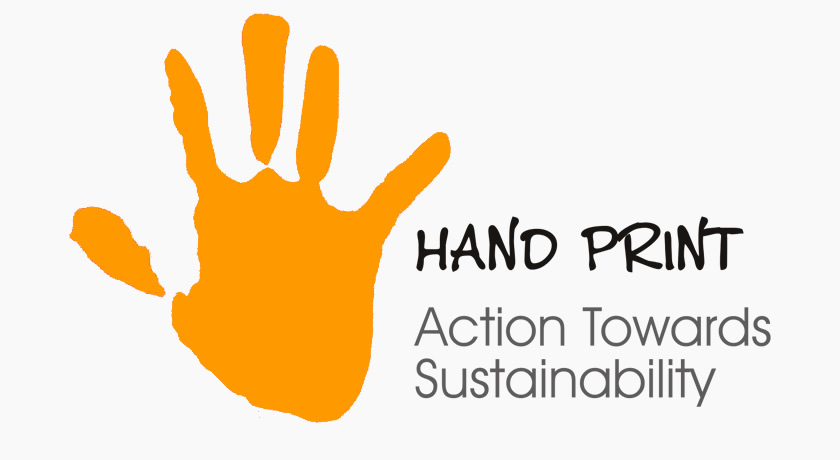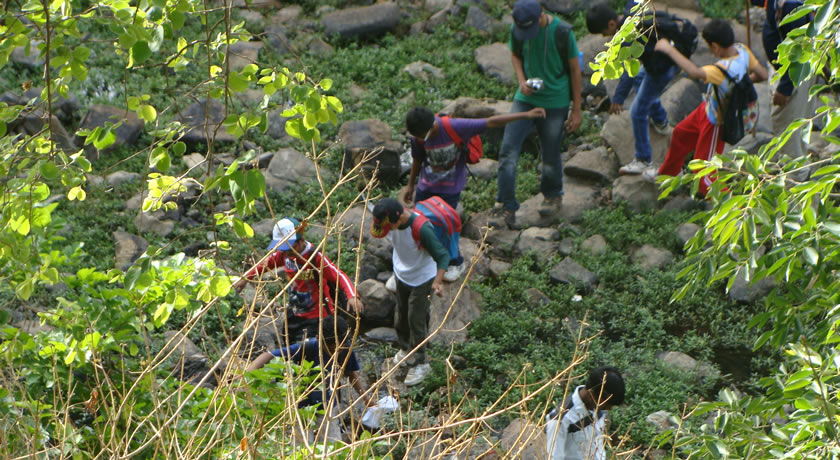 |
| |
e-newsletter of the Centre for Environment Education |
|
|
 |
| June 16 -30, 2013 |
|
 |
|
 |
| Faces provide the canvas for painting desert flora and fauna |
 |
|
| World Day to Combat Desertification and Drought at Jaipur |
|
To commemorate the World Day to Combat Desertification and Drought; CEE Jaipur in partnership with Rajasthan State Bharat Scouts and Guides, organised an event on June 17. Around 200 students participated in the event. Environmental Housie. This game linked climate change and it’s effect of desertification and drought on the local biodiversity.
Face painting competition was organised too, in which the participants drew pictures of various organisms found in the desert and semi arid region. It also provided an opportunity for them to communicate their green messages for environment conservation with creativity. |
 |
|
 |
| The programme was attended by 120 teachers along with representatives from the Education Department of Dadra and Nagar Haveli. |
 |
|
| Eco-club programme in Dadra and Nagar Haveli |
|
Mr. Parthesh Pandya, Programme Coordinator, CEE West and Rural Programmes Group (RPG) was invited by the Administrator, Dadra and Nagar Haveli to provide support towards strengthening the environment education activities in schools of the Union Territory. Discussions were held in areas of training of teacher’s in-charge; resource material; facilitation and monitoring of activities, eco-club grant and how to mainstream it with the national initiative under National Green Corps and Paryavaran Mitra programme.
An orientation programme was also organized from June 24-26 at Silvassa, Dadra and Nagar Haveli. The CEE West and CEE Bilpudi Team facilitated the three-day capacity building progarmme with sessions focusing on pedagogy, programme planning and practical demonstration of activities under the themes of biodiversity; waste management; and water. |
 |
|
Sundarvan : CEE’s Nature Discovery Centre: |
 |
| Exploring and discovering the world of snakes |
 |
|
Reptile Awareness Programme
|
A reptile awareness programme was conducted for fifty staff members of Tata Motors Limited on June 14 at Sundarvan Campus. The participants were introduced to snake facts; commonly seen snakes of Ahmedabad; big four venomous snakes; precaution to avoid snakebite; first aid and treatment for bite; myths and facts, and conservation issues. They were exposed to the basic instruments used to rescue snakes; ways of rescuing snakes without touching them; post-rescue handling and release processes during this two and half hour session. Volunteers (Mr. Tushar Daftari, Tej Daftari and Pavan Patel) provided excellent support to make the programme a success. |
 |
|
|
 |
| Every tree counts! |
 |
|
| Tree Count in Sundarvan |
|
Sundarvan (Sundar means beautiful and Van means forest). This is an apt name for this small piece of vegetation-covered land sandwiched between tall buildings in the city of Ahmedabad. The park provides faunal-floral diversity as a wonderful opportunity for nature education. A tree count was recently conducted in Sundarvan. All the trees above 20 cm Girth at Breast Height (GBH) found in the premises were counted. Details such as the name of the tree, GBH, live or dead, and the presence or absence of leaves, flowers and fruits were noted down. The counted trees were marked with paint to avoid double counting. A total of 708 trees including 48 species were recorded.
The subabul Leucaena leucocephala was the most abundant tree counted in the Park, followed by Neem Azadirachta indica. Out of the 708 trees, 55 dead trees were identified in the campus. The tree count document will serve as a database for comparison in the future. It shows the tree species combination and will be useful for further planning on landscaping and plantation.
The exercise was carried out with the help of volunteers Mr. Pavan Patel, Ms. Devanshi Kukadia and Mr. Anuj Trivedi. From CEE Ms. Sneha Dharwadkar, Project Officer, Protected Area Interpretation and Eco-tourism and
Ms. Amruta Badheka, Project Officer, Rural Programmes Group helped in species identification. Mr. P. D. Karangia from Vikram Sarabhai Centre for Development Interaction also contributed to this process. |
|
 |
|
|
 |
| |
 |
| Sharing adventure and experience in Mt. Abu |
 |
|
Experiencing Nature Programmes: |
|
| Nature Camp at Mt. Abu |
|
A nature camp to Mt. Abu, Rajasthan was organized from June 4 - 9 for children from both rural and urban Gujarat to encourage interactions between the two groups, and share perceptions towards nature and environmental issues.
Various activities and interactions presented ample opportunities for children to interact among each other, understand and accept each other. There were discussions about the varied lifestyles of each group. As the interaction increased, after the second day the children bonded as a team.
Activities such as trekking, rock-climbing, rappelling, reptile awareness programme, art and craft, bird watching and star gazing provided a sense of shared adventure and discovery. On the last day, there was a painting competition on the theme ‘Mt. Abu and Nature’ which brought out the creative side of the participants. The bonding among the children was evident in their reluctance to bid each other goodbye when the camp ended. |
 |
|
|
 |
| Tthe Little Green Bee-eater was one among the many types of birds which were spotted during the visit. |
 |
|
| Sarus Watch at Kheda Wetlands |
A one-day field visit called ‘Sarus Watch’ was organized on June 23 at Kheda Wetlands. The visit aimed to create awareness about the habitat, food and life-cycle of the majestic Sarus crane, the only resident crane of India and the tallest flying bird in the world. The participants included students, professionals, bird-watchers and photographers.
Three wetlands of Kheda district were visited and birds were observed. About 75 Sarus cranes were counted. Some birds displayed courtship behaviour that is typical during the onset of the monsoon.
Pariej Interpretation Centre was visited too and a proper understanding of wetlands was developed. The other activities included a quiz and painting competition wherein observation skills were kept in mind while deciding the winner. Children had fun during the body painting competition that was organized. In the end, the concept of ‘Site for Special Scientific Interest’ (SSSI) was introduced and explained. |
 |
|
| State Level Consultation on Ecological Rights |
|
Ms. Preeti R. Kanaujia, Programme Coordinator, CEE North and Mr. Neeraj Kumar Pal, Project Officer, CEE North jointly delivered a lecture on the ‘Concepts of Ecology, components of ecology, ecological imbalance and Ecological Rights’ during the State level consultation workshop on Youth Network on Ecological Rights. The workshop was organized by Participatory Action for Community Empowerment (PACE) with support from other agencies and Terre des Hommes Germany at Lucknow on May 22.
More than 70 participants from different locations of Uttar Pradesh including students, teachers, NGOs and media representatives attended this workshop. The main aim of this workshop was to build the capacity of youth towards understanding the concepts of ecology, interdependence, our associated survival, and sustainability in the people’s livelihood and also their ecological rights. The workshop looked at ecological rights as third generation human rights. Participants were given an overview on various concepts related to ecology which govern the whole system and maintain the balance in the nature.
A discussion was initiated by Ms. Kanaujia and Mr. Pal to engage the participants in better understanding the interdependence among all the creatures on the earth, and their inter connectedness with human beings. Our rights are directly associated with the rights of other components. Our rights would never be ensured unless we ensure the rights of all components of the ecosystems and the environment. |
 |
|
|
|
| The First Dialogue on Article 6 of United Nations Framework Convention on Climate Change |
The UNFCCC (United Nations Framework Convention on Climate Change) Secretariat had invited CEE to contribute to its 'First Dialogue on Article 6 of the Convention' (awareness, training and education) which was held as a special event on June 10-11 during the intersession taking place in Bonn, Germany. Ms. Rixa Schwarz, Programme Coordinator, CEE Germany, talked about 'Beyond Awareness: Education for Change'.
While representatives of countries presented their strategies and concepts on how to implement education and training in their respective nation, civil society was invited to share approaches and experiences on challenges, good practices and lessons learned while implementing climate change education at the national level. Ms. Schwarz highlighted how successful climate change education can bring about change in behaviour towards adopting low-carbon lifestyles. Examples from India focussed on the public transportation sector, one of it being the Bus Rapid Transport System of Ahmedabad. She also introduced the Handprint Concept to the UNFCCC audience that supported the linking of climate change education to ESD. |
|
|
|
|
 |
CEE is the ENVIS centre on Environmental Education (EE). As an ENVIS centre, CEE caters to the information needs of environmental educators. Write to the CEE ENVIS Centre at [email protected]
|
 |
|
 |
 |
This message is sent to you by Centre for Environment Education, Thaltej Tekra, Ahmedabad, India and delivered by [email protected]
© CEE 2013 Editorial team: Mamata Pandya, Carol Dsouza, Design: Pankaj Gorana |
|
|
|